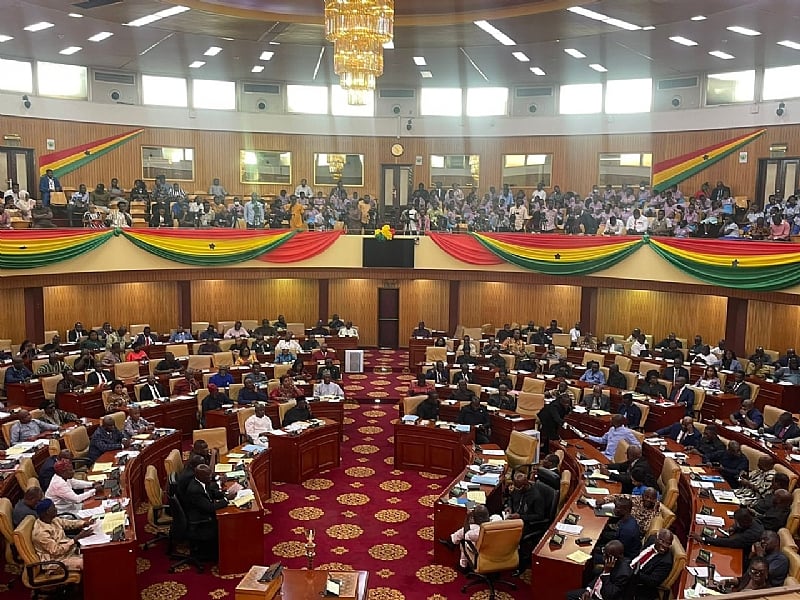The Ghanaian Parliament has given its seal of approval to the 2025 Appropriation Bill, paving the way for the government to expend a substantial GHC293 billion from the consolidated fund and other public revenue sources during the 2025 fiscal year. This figure represents the government’s total estimated expenditure for the year, encompassing all planned outlays across various sectors and government agencies. A significant portion of this budget is dedicated to personnel emoluments, with GHC68 billion earmarked for wages and salaries of public sector employees, highlighting the government’s commitment to meeting its obligations to its workforce. Notably, the approved budget also includes GHC13 billion allocated specifically for the settlement of arrears, suggesting a concerted effort to address outstanding financial commitments and streamline government operations. The passage of the bill marks a critical step in the nation’s budgetary process, authorizing the government to implement its financial plans for the upcoming year.
The approval of the 2025 Appropriation Bill underscores the culmination of a complex and meticulous legislative process. Before reaching this stage, the bill underwent rigorous scrutiny and debate within Parliament, where members of the house had the opportunity to examine the proposed expenditures, question the government’s priorities, and propose amendments. This deliberative process ensures transparency and accountability in the management of public funds, allowing for public input and legislative oversight of government spending. The debates surrounding the bill likely involved discussions on the allocation of resources across different sectors such as education, healthcare, infrastructure development, and social welfare, reflecting the government’s strategic priorities and its vision for the nation’s development. The final approval signifies a parliamentary consensus on the appropriateness and feasibility of the proposed budget.
The allocation of GHC68 billion for wages and salaries represents a significant investment in human capital and reflects the government’s commitment to supporting its public sector workforce. This substantial allocation could encompass salary adjustments, allowances, and other benefits for employees across various government departments and agencies. The size of this allocation underscores the importance of the public sector in delivering essential services to the citizenry. Furthermore, it is likely influenced by factors such as the size of the public sector workforce, prevailing wage rates, and any planned adjustments in compensation structures. The allocation also reflects the government’s efforts to maintain a motivated and productive workforce, recognizing the crucial role of public servants in achieving national development goals.
The GHC13 billion earmarked for the payment of arrears is a crucial aspect of the approved budget, demonstrating the government’s commitment to fiscal responsibility and its resolve to address outstanding financial obligations. Accumulated arrears can hinder efficient government operations and negatively impact service delivery, making their clearance a priority. This allocation may address arrears in various areas, including supplier payments, contractor fees, and potentially outstanding debts to public sector employees. By addressing these arrears, the government aims to improve its financial standing, enhance its credibility with stakeholders, and create a more stable and predictable financial environment. This commitment to clearing arrears ultimately contributes to a more efficient and effective public sector.
The passage of the 2025 Appropriation Bill marks a critical milestone in Ghana’s budgetary process, providing the government with the necessary authority to implement its financial plans for the upcoming year. This authorization allows the government to commence spending in accordance with the approved budget, effectively putting its fiscal policies into action. The budget, as approved, represents the government’s roadmap for revenue allocation and expenditure, outlining its priorities for national development and its commitment to delivering essential services to the population. The successful implementation of the budget will be crucial for achieving the government’s economic and social objectives for the year.
The announcement of the bill’s passage by the First Deputy Speaker, Bernard Ahiafor, signifies the formal completion of the parliamentary process and the transition to the implementation phase. This marks the culmination of a series of deliberations, debates, and reviews that have shaped the final version of the Appropriation Bill. The government now bears the responsibility of ensuring that the allocated funds are utilized judiciously and transparently, in line with the intended purposes outlined in the budget. The implementation of the budget will be closely monitored by various stakeholders, including civil society organizations, the media, and the public, to ensure accountability and effectiveness in the utilization of public resources. The successful implementation of the budget will play a crucial role in determining the government’s ability to deliver on its promises and achieve its development goals for the nation.














